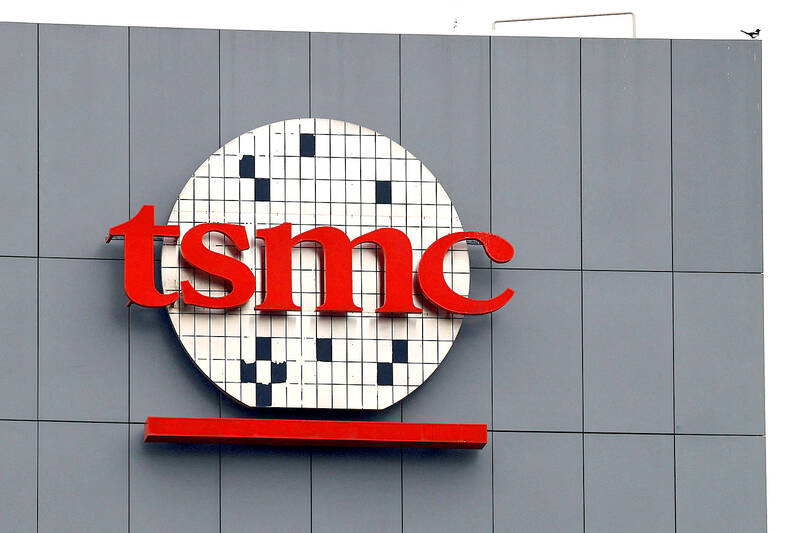Taiwan Semiconductor Manufacturing Co (TSMC, 台積電) has begun producing advanced 4-nanometer (nm) chips for US customers in Arizona, US Secretary of Commerce Gina Raimondo said, a milestone in the semiconductor efforts of the administration of US President Joe Biden.
In November last year, the commerce department finalized a US$6.6 billion grant to TSMC’s US unit for semiconductor production in Phoenix, Arizona.
“For the first time ever in our country’s history, we are making leading edge 4-nanometer chips on American soil, American workers — on par in yield and quality with Taiwan,” Raimondo said, adding that production had begun in recent weeks.

Photo: Reuters
“That’s a big deal — never been done before, never in our history, and lots of people said it couldn’t happen,” Raimondo said of the previously undisclosed production start.
A spokesperson for TSMC, the world’s largest contract chipmaker and a major supplier to Apple and Nvidia, which is to report earnings next week, declined to comment on Friday.
TSMC in April last year agreed to expand its planned investment by US$25 billion to US$65 billion and to add a third Arizona fab by 2030.
COURTING FIRMS
The US Congress created a US$52.7 billion semiconductor manufacturing and research subsidy program in 2022.
All five leading-edge semiconductor firms agreed to locate fabs in the US as part of the program.
Raimondo earlier said that the Department of Commerce had to convince TSMC to boost its US plans.
“It didn’t happen on its own... We had to convince TSMC that they would want to expand,” Raimondo said.
TSMC would produce the world’s most advanced 2-nanometer technology at its second Arizona fab, which is expected to begin production in 2028.
The company also agreed to use its most advanced chip manufacturing technology, called “A16,” in Arizona.
The department has also awarded TSMC up to US$5 billion in low-cost government loans.
Raimondo said she wants the US to make 20 percent of world’s leading-edge logic chips by 2030 — up from none before TSMC began production in Arizona.
In April last year, the department said TSMC expects to begin high-volume production in its first US fab by the first half of this year.
The department last month finalized an award of US$407 million to help fund Amkor Technology’s planned US$2 billion advanced semiconductor packaging facility in Arizona, which is set to be the largest of its kind in the US.
Amkor’s Arizona plant, when fully operational, would package and test millions of chips for autonomous vehicles, 5G/6G and data centers. Apple would be its first and largest customer with the chips produced at a nearby TSMC facility.

SEPARATE: The MAC rebutted Beijing’s claim that Taiwan is China’s province, asserting that UN Resolution 2758 neither mentions Taiwan nor grants the PRC authority over it The “status quo” of democratic Taiwan and autocratic China not belonging to each other has long been recognized by the international community, the Mainland Affairs Council (MAC) said yesterday in its rebuttal of Beijing’s claim that Taiwan can only be represented in the UN as “Taiwan, Province of China.” Chinese Minister of Foreign Affairs Wang Yi (王毅) yesterday at a news conference of the third session at the 14th National People’s Congress said that Taiwan can only be referred to as “Taiwan, Province of China” at the UN. Taiwan is an inseparable part of Chinese territory, which is not only history but

CROSSED A LINE: While entertainers working in China have made pro-China statements before, this time it seriously affected the nation’s security and interests, a source said The Mainland Affairs Council (MAC) late on Saturday night condemned the comments of Taiwanese entertainers who reposted Chinese statements denigrating Taiwan’s sovereignty. The nation’s cross-strait affairs authority issued the statement after several Taiwanese entertainers, including Patty Hou (侯佩岑), Ouyang Nana (歐陽娜娜) and Michelle Chen (陳妍希), on Friday and Saturday shared on their respective Sina Weibo (微博) accounts a post by state broadcaster China Central Television. The post showed an image of a map of Taiwan along with the five stars of the Chinese flag, and the message: “Taiwan is never a country. It never was and never will be.” The post followed remarks

NATIONAL SECURITY: The Chinese influencer shared multiple videos on social media in which she claimed Taiwan is a part of China and supported its annexation Freedom of speech does not allow comments by Chinese residents in Taiwan that compromise national security or social stability, the nation’s top officials said yesterday, after the National Immigration Agency (NIA) revoked the residency permit of a Chinese influencer who published videos advocating China annexing Taiwan by force. Taiwan welcomes all foreigners to settle here and make families so long as they “love the land and people of Taiwan,” Premier Cho Jung-tai (卓榮泰) told lawmakers during a plenary session at the Legislative Yuan in Taipei. The public power of the government must be asserted when necessary and the Ministry of

Proposed amendments would forbid the use of all personal electronic devices during school hours in high schools and below, starting from the next school year in August, the Ministry of Education said on Monday. The Regulations on the Use of Mobile Devices at Educational Facilities up to High Schools (高級中等以下學校校園行動載具使用原則) state that mobile devices — defined as mobile phones, laptops, tablets, smartwatches or other wearables — should be turned off at school. The changes would stipulate that use of such devices during class is forbidden, and the devices should be handed to a teacher or the school for safekeeping. The amendments also say